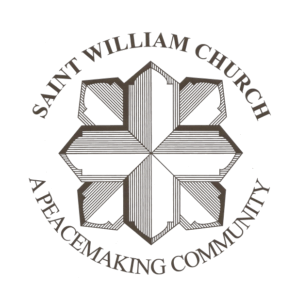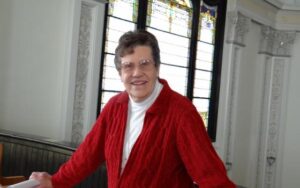
compartir
I pray that the church ordains women to the diaconate, because the women who minister on behalf of Jesus and the Church need the grace of ordination to make a greater impact on the lives that they serve. What I mean is that when an ordained representative of Christ and the Church comes and blesses someone—or serves and works alongside the poor, the sick or the marginalized—the grace of that encounter is received more fully. If we allow women to be ordained to the diaconate, God’s grace will be more abundantly poured out on the people of God.
From a sacramental perspective, the woman who did sacramental prep with the couples could witness the marriages, and their homily could speak more intimately to the couple’s desire for their marriage. It’s the same for baptisms, where the person leading the preparations could offer a homily that reflects the teachings and the parents’ desires for their children. As ministers of charity, many women already run a lot of those charities, be it soup kitchens, hospital ministry or prison ministry, but the people being ministered to often feel the presence of Christ more when it is the ordained representative of Christ present to them. Ordination has gravitas and authority; the ordained person becomes a sign and symbol of Christ serving God’s people. This meaning is not lost on the people being ministered to. The grace of God is felt more deeply when a deacon, a priest, or the pope is the one who comes to wash someone’s feet, to give them food, to listen to their concerns, to give counsel and consolation that God loves and forgives them, or to bring communion to people in the hospital or to the homebound. By allowing women to be deacons, more people could be ministered to by Christ working in them.
I believe the mission of Discerning Deacons is important because historically there were women deacons, and today there are women who feel the call, but their hands are bound until the Church allows them the fullness of their ministerial calling. I also think ordaining women to the diaconate will increase the respect and dignity of women around the world. The more women are viewed as able to lead, preach, and serve the people of God with the church’s authority and blessing, the more the dignity of women will be raised everywhere.
I have always felt a calling to pray, love, teach and serve. I have experienced God’s deep love for me, and I want nothing more than to share God’s love in word and deed. I have taught formation classes, RCIA, Baptism Prep, Ongoing Adult Formation. I have led retreats, and I am a spiritual director trained in the spiritual exercises of St. Ignatius Loyola. I have been given the privilege of bringing communion to the hospitalized and homebound.
I have been a bridge to many on the margins—to the LGBTQ community, to those who have left the Church, to the homeless and addicted, to women who are victims of abuse, and to those seeking to come back to the Church. The people love God, they love Jesus, and many have said, “If more Catholics were like you, I would be Catholic.” I know that the conversations I have would mean even more to people if I had the Church’s blessing and the grace of ordination to minister to them.
When I have been given the opportunity to preach and break open the word, it has brought many into a deeper relationship with God and with the sacraments. I long for the day when I can freely minister and have the church-given authority to do so. Many women feel bound, like we aren’t free to minister as fully as we could if we were ordained. For me, ordination is not about honor, power or prestige, but the authority and grace to serve the people of God through the word, the sacraments and service.
If I could be ordained a deacon, the people would hear the Good News preached with authority at the pulpit and in the world. For me personally, it would feel like the ability to serve in the manner in which God has put on my heart to serve. As a minister of the word, liturgy and charity, I would preach the word to inspire others to love God and their neighbor. I would continue to bring communion to the sick and imprisoned, but I would also free our priests by taking on some baptisms, weddings, and funeral services that are outside of the Mass. It would feel like the fullness of what I was meant to do.
Jesus, you came to heal the broken hearted. You taught us how to accompany those on the margins and bring them into community. Bless and strengthen those who preach your word, those who tend to the sick, and those who minister to the outcasts. Help our church to recognize the giftedness and dignity of women who minister in your name, and God we pray, that one day soon, women will be granted the grace of ordination to the diaconate. We ask this through Jesus Christ the Servant. Amen.
Theresa Shepherd-Lukasik is the Director of Adult Faith Formation where she leads lifelong adult faith formation, retreats, spiritual direction, OCIA program, Infant Baptism Prep, LGBTQ Ministry, Women’s Ministry, Young Adult Community, Communion to Homebound ministry, and gives lay reflections at St. Joseph Parish, Seattle.
Reciba Nuestro Boletín Informativo
Aquí es donde compartimos noticias relevantes, eventos y oportunidades para participar en la labor.
*Únicamente enviaremos el boletín una vez cada semana, y nunca compartiremos o venderemos su información.


